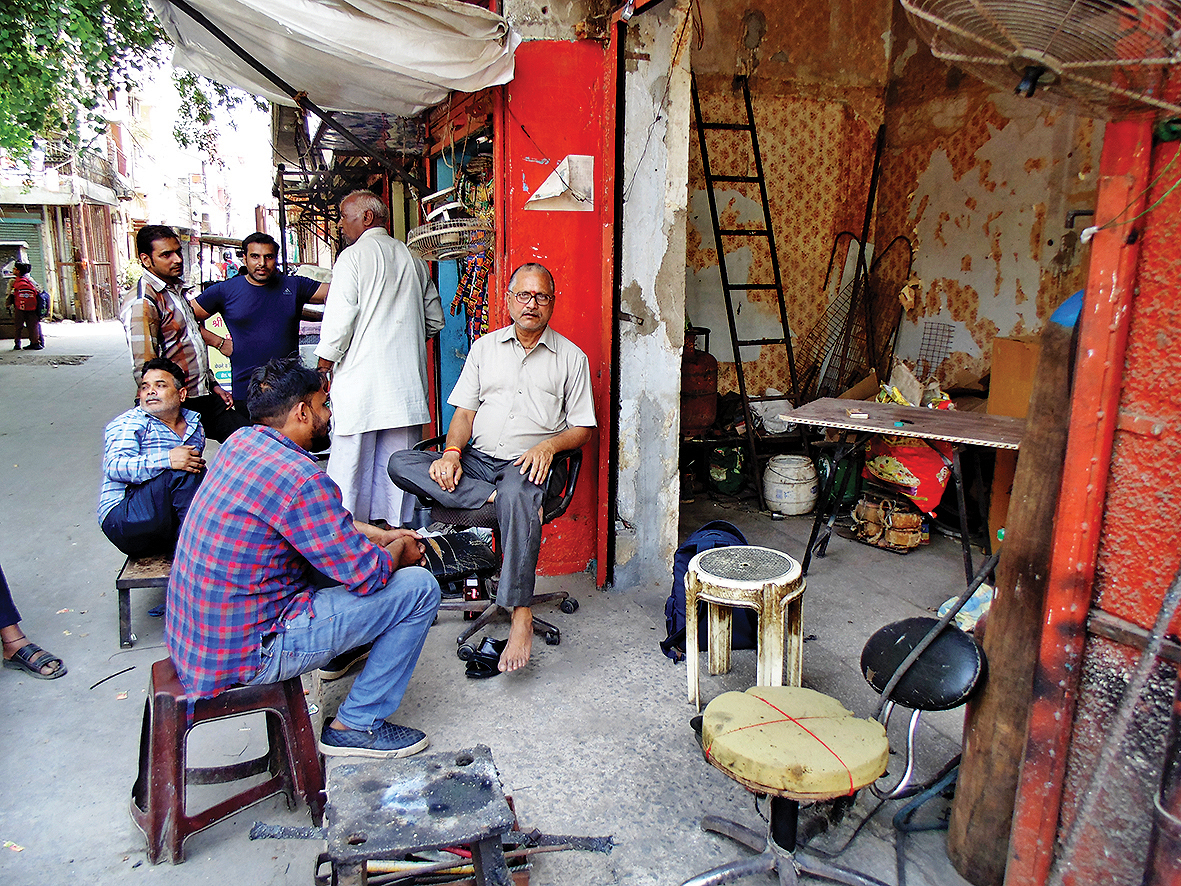How is public opinion shaping up in the three Delhi Assembly segments which did not vote for the Aam Aadmi Party in the 2015 poll? Patriot finds out
The one-month countdown to Delhi’s Voting Day (May 12) for the Lok Sabha has begun. With a possible alliance between the Aam Aadmi Party (AAP) and the Congress still proving elusive, it’s interesting to see what’s happening on the ground in Vishwas Nagar, Mustafabad and Rohini. These were the only three Assembly seats which the AAP lost in 2015 to the BJP. In two out of these three constituencies, the results went in BJPs favour because votes got divided between the two secular parties.
The two localities which went against the tide were Vishwas Nagar and Mustafabad, which fall under East Delhi and North East Delhi constituencies respectively. Rohini falls under the North West parliamentary constituency and the BJP win was no random choice as it has historically been a saffron stronghold. The exception was the 2013 Assembly polls which brought AAP into power after a post-poll alliance with Congress. Rohini had voted for AAP then but changed its mind the next time around.
In Vishwas Nagar, BJP triumphed in both the 2013 and 2015 polls. Before that it was a Congress bastion with Naseeb Singh winning three times. Mustafabad, which came into existence in 2008 due to the implementation of the recommendations of the Delimitation Commission of India, has since then voted for the Congress. In 2015, however, margins were low as AAP took a major chunk.
We meet a few voters in these areas to understand which way they are leaning.
Vishwas Nagar
A small shop has a giant vessel full of steaming biryani at the entrance. Two brothers — who look like they frequent gyms — are inside.
Asim’s daily routine is to reach his shop by 7 am, start cooking his vegetarian biryani, which is ready to be served by 9 am. His response as to why he doesn’t make non-vegetarian biryani is that his customers — the people who live around the area — will not eat it for fear that their neighbours see them indulging in it. It is a practice not accepted among ‘pure’ vegetarians.
His brother Adil, a year younger, sits on one of the two chairs inside, eating the biryani. True to his appearance, he is a gym manager in a hotel.
The idea to start selling biryani became a reality just two months ago in February after almost a year of uncertainty for the elder brother. The shop he had taken over at the age of 18 in 2006, after his father passed away, had to be closed down in March 2017 because of heavy losses.
This was the direct impact from the sealing drive that took place in this once industrial area. The store which was opened in 1992 by his father sold bathroom fittings and the suppliers were factories which operated in the same area. With the sealing drive, the factories shut and relocated. Asim’s supply line was disrupted.
This is one of the reasons why, they say, they now support AAP — which has been very vocal about the Supreme Court-ordered sealing drive in the Capital. “First this area was a Congress stronghold. But AAP has given us education and better healthcare so now we feel differently”, Asim adds. The reason why the people here will not vote for the BJP again, he says, is the impact of the sealing drive on businesses where the “middle class have suffered”.
He is upset about the fact that many voters may get blindsided by the government’s use of the “national security threat to their benefit”. He argues that security was always important but has been used to the ruling government’s advantage.
He also says, “Religion has been used to divert people’s minds from what is important”. Instead of talking about “jobs, education, healthcare, they make people speak about Ram Mandir”.
He says all of them (including owners of the factories that were sealed) eagerly await the outcome of the Lok Sabha election. Depending on the verdict, he will move out and open a bigger shop where he can sell non-vegetarian biryani. At present, he makes no profit or loss.
Right next to Asim’s eatery is a mechanic’s shop. Customers stand around getting tyre punctures fixed as we speak to the owner Acchelal (62) and one of his employees Satish (27).
Both, without any prompting, speak about Ram Mandir. While Satish believes it would not be built even if BJP wins a second term, the older man still has his hopes pinned on such a situation.
Acchelal first opened the store 25 years back, selling beedis. With failing health, he decided he couldn’t keep it going all day long, and thus switched to repairs, where he could employ people to do the work and supervise for a couple of hours in a day.
While now he is a staunch BJP man, Acchelal admits that Congress MLA Naseeb Singh had done good work in the area, and would have won again “if not for the AAP coming in and dividing the votes”.
In 2015, the Congress and AAPs numbers were at 20,634 and 47,966, respectively. BJP was at 58,124. Now, he says, the place has not seen any development in the four years: No work has been done by the MLA Om Prakash Sharma nor BJP MP Mahesh Giri. The two have not visited the area since being elected.
The drains are clogged, and the civic amenities deteriorating. His business too, has been failing. With the industries all gone, customers are few and far between.
But while he complains about it all, in the same breath he avers that Narendra Modi will win. In essence, as he bluntly put it, no matter if work has not been done, “90% of population here are Hindus and we will vote for BJP because it will be a vote for Modi. We are all like-minded here.”
And proving Asim’s words, his neighbour admits that BJP will win “because of religion. Muslims will not vote (for BJP) because of
religion”.
ROHINI
The first sub-city of DDA, Rohini is a largely middle class dominated area with a strong BJP affiliation. In 2013, the AAP got 1,872 votes more than the BJP. In 2015, the latter won by 5,367 votes.
Many young people we came across had not gotten themselves registered for a voter ID card, while many others did not wish to speak about politics.
We finally met Narendra Kumar, a retired public servant, who says he knows what’s happening in his area because he goes to the park every morning where discussions take place about the political scenario in the country.
Having lived in Rohini for the past 30 years, Kumar says that North West Delhi will deliver a seat to BJP “no matter who is campaigning for them”.
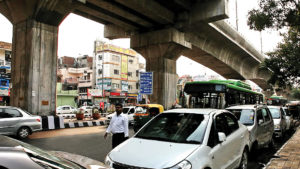
And this, he says, as other BJP supporters have earlier referenced, is because “we are voting for Modi”. He has put India on the “global map”, Kumar says.
“People care about the country now, earlier no one did. Manmohan Singh (the former Prime Minister) was even made to remove all his clothes at a US border control, that is how much they disrespected us,” Kumar alleges.
As we pointed out that he has based his argument on false news, he replies: “Whatever it is, Modi has made everyone respect us”.
Despite this preference, he admits that many people like AAP because they promised free water and electricity. “If you promise this, the poor people will definitely vote for you. And that is what happened earlier. But for Lok Sabha, I don’t think it will work”.
In the same context he gives the example of Congress and its promise of minimum income to the poorest of poor under NYAY. “With the majority being uneducated, maybe it will win them votes”.
He says that other than that, the Congress has nothing to entice voters. “Priyanka Gandhi is beautiful, but what will that do for the people?” he remarks unabashedly. “They themselves are chors (thieves) and they call the chowkidar (Modi) chor”.
“The situation is such that Congress supports Pakistan. I have seen on TV the development that has taken place under the BJP. My vote, and that of most people here, will go to them”.
MUSTAFABAD
Walking through Nehru Vihar, we make our way to New Mustafabad. Nehru Vihar has open sewers in which the muck lies open, stagnant. A woman sweeps the trash from outside her home, including chips wrappers, into that drain.
You think the situation here is deplorable until you enter New Mustafabad, some 500 metres away.
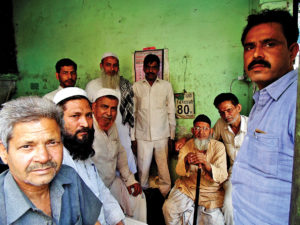
It was a Tuesday when we visited and the place was overrun by shoppers and people selling vegetables and other items in the weekly market. The sea of chaos would be normal for any street with such a market but what made it tragically different were the drains’ content seeping into the road, where everyone tried to go about their business without much fuss.
To make matters worse, a drain was opened up to be repaired, and has remained so for two months. Absolute lack of planning has made it an obvious health and safety nightmare. The people here complain that the stagnation of sewage water has been a problem for the past four years, and it has even
trickled into their graveyard.
So pressing are the sanitation issues here, that as we interview some people inside a shop, more join in to relate their problems. As we walk around people stop us, urging that we inform the authorities about the neglect of the settlement.
Despite being nudged to keep quiet, a few point out that the condition of their area is directly a result of being Muslim dominated. “Just look at Nehru Vihar where there are more Hindus, it’s so different. Because this place is filled with Muslims, they don’t care”.
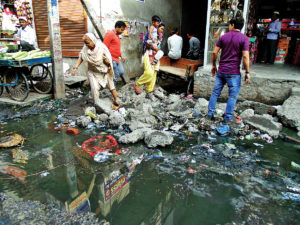
What he speaks of is like a ghettoised area and this one is an unauthorised one.
Qari Mohammad Asjad, who sells biryani and watermelons ,says that the reason why BJP came to power in this area was because of the division of votes. “Two candidates were Muslims — one from AAP and the other from Congress — so the votes got divided”. Hasaan Ahmed of the Congress, who won in 2013, received 52,357 votes in 2015. AAP’s Mohd Yunus received 49,791 votes while the winner, BJP’s Jagdish Pradhan, received 58,388.
As we sit discussing the impending polls, an argument breaks out. A majority, led by Asjad, blames Wahajuddin, a medical practitioner, and people like him “who voted for the AAP and helped BJP win”. Wahajuddin says he is an AAP supporter; once he leaves, people say he is actually an ‘AAP worker’. They say people like him swayed the result in an earlier Congress dominated space.
But the reason for them to resolutely not vote for the BJP in these Lok Sabha polls is not because of “what they (BJP) feel.That Muslims won’t vote for them but because no work has happened here. Things have only gotten worse”, says Mohd Iqbal Iddrishi.
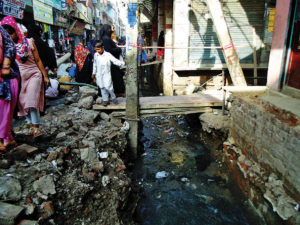
He says that Hindus and Muslims have lived in the area happily together. “There’s no divide”, he says, but rethinks and says “Maybe a bit since 2014”. A young man in the group tells us with his smile still intact that he has been stopped at least four times by men of some fringe group in the outer areas. They ask him questions and try to intimidate him.
We then met Alim Pradhan, who lost his granddaughter three years ago to a drain in the same road. She was nine years old and was playing when she slipped and fell. Even after this tragedy, things have not changed. “We have an AAP councillor but how will that help when they are in constant tussle with the Centre (BJP)”.
“No one comes to see our problems, and no one cares”, he adds despondently.
Pradhan has been living in this area since 1983 and has only seen things get worse for people around. And now, he says, the government tries to divide people further. “What do we care about Pakistan? Do they think if a war happens, we will be spared? We are Indians, part of India and that is exactly how we will be viewed”.
Earlier, he says, there were no problems in the area, but now issues have been cropping up. “Someone from RSS” he alleges, “came and broke a murti in Gali Number 13, to fuel some fire. But we immediately fixed the situation”.
“We even protect the Mandir in the area, because people may try and start something”.
Amid this conversation of Hindu and Muslim, this place is in dire need of an intervention. Water is still supplied by tanks and the civic distress is ghastly. Yet when this constituency as a whole votes, religion will be an overwhelming factor.

